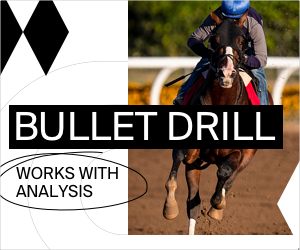Thanksgiving turkey gravy had hardly congealed when a mature man’s attention turned toward spring and the first Saturday in May. If you think late November is too early to begin analyzing that race’s outcome, you probably aren’t interested in the Kentucky Derby Future wager presented by Churchill Downs and available at Xpressbet. That’s how the majority of US-based horseplayers can get down early on which horse will win the run for the roses.
Thanksgiving weekend was the first of four opportunities to dive into such pools. Additional action will be presented Feb. 7 – 9; March 6 – 8 and April 3 – 5. All pools open at Noon and close at 6 pm on each final day.
Pool 1 wagering began the day after Thanksgiving and concluded Sunday, with closing pari-mutuel odds, as usual, established by the public. Derby future investments, however, unlike most pari-mutuel wagers, pay off at fixed odds—sort of. We say ‘sort of’ because, while prices can change as long as each individual Derby wagering pool remains open, when wagering closes, punters are guaranteed payoffs at the odds they’ve secured, no matter the ultimate final mutuel return on Derby day. In that sense, future players are able to ‘lock in’ wagers at particular prices.
Future wager pools also are offered on the Kentucky Oaks (March 6 -8); the sire of the Derby winner (Nov. 28 – Dec. 1) and the Oaks/Derby Double (March 6 – 8). Exacta wagering for runners and sires also is offered.
Personally, I’m not a Derby future wager guy. I like to study 2-year-old form and future odds, but rarely get involved financially. Which may be foolish because I’m actually ahead of the ‘future’ game.
As I’ll Have Another (15.30-1) won the 2012 Kentucky Derby, I desperately scanned numerous failed exacta and trifecta wagers. Nothing. An empty wagon. Dejected, I then turned my attention to handicapping the next race at Churchill Downs.
Suddenly, I remembered that earlier in the year I had made a decent-sized future wager on the Doug O’Neill-trained Derby winner. I accessed my Xpressbet account balance and voila! Despite several Derby day misfires, it had grown!
So, you see, I should be a huge fan of the future wager. But I’m not. Never have been. So, why did I make that winning wager? Opportunity smiled; I remember because it seldom does. I happened to be on a hot streak at the time and my wagering account was flush. I watched I’ll Have Another win the Robert Lewis at Santa Anita and thought, ‘Man, that horse sure looks good.’ I consulted his future odds and found a fair price, so I made the bet.
Next out, I’ll Have Another battled Creative Cause to a mere nose victory in the Santa Anita Derby and I cooled on his Derby chances. I didn’t have anything on him Kentucky Derby day, but that two-month old future wager was in pocket.
You might wonder, if it worked so well eight years ago, why haven’t I done the same thing since? Well, to be honest, these days, my account balance seldom is ‘flush,’ and I don’t like tying up bread for months at a time. I know, a ‘future wager’ is supposed to be an investment in the ‘future.’ I get it. However, I have enough difficulty picking the winner of the next race with 2 minutes to post—let alone 2 months out. Plus, I figure if a player’s going to take a swing at naming the Derby winner several months beforehand, he ought to get an extremely healthy reward. With just 24 wagering interests in each Churchill pool it’s difficult to garner massive odds on a legitimate outsider. First of all, for a horse even to be included in Churchill’s 24 wagering interests, he has to have done something to put him on the map. And that means most of the ‘value’ is gone.
Vegas used to be the US-based place where a player could parlay a correct early Derby opinion into a real score. Now, not so much. Following master oddsmaker John Avello’s Wynn departure, William Hill appears, to my knowledge, as the only game in town with a true Kentucky Derby Future Book that offers 89 wagering options instead of Churchill’s 24.
My favorite Kentucky Derby future wager tale occurred a few years ago and features a mid-February $500 wager at 300-1 odds on an unraced 3-year-old colt. Although trained by Bob Bafffert, this colt wasn’t on anyone’s Derby radar. It actually could be argued that 300-1 odds may even have been too short a price! After all, at that time, no horse since Apollo in 1882 had won the Kentucky Derby without starting as a 2-year-old—one of the longest, if not the longest curse in sports.
Of course, Justify not only succeeded in Kentucky, but he also took the Triple Crown. The winning ticket holder, a friend of mine who had shown me a snapshot of the wager on his cell phone two months earlier, collected $150,000!
Clearly, making correct future wagers can be rewarding…extremely rewarding. And they can be fun, too.
We’d all like to predict the future. In some ways, horseplayers are like fortune tellers. We use past performances, sheets, Beyer Speed Figures, etc. instead of crystal balls, wrinkled palms and Tarot cards to see down the road. One huge difference, though, between fortune-tellers and gamblers is that is that soothsayers are paid in advance, gamblers collect only when they’re correct.
Race On!

